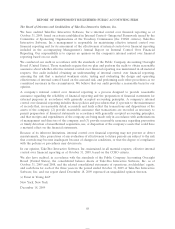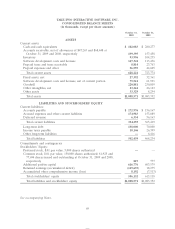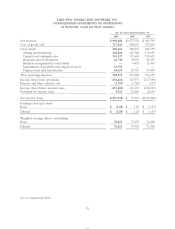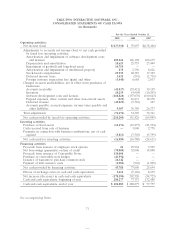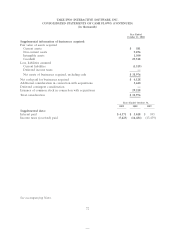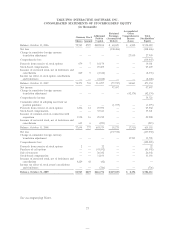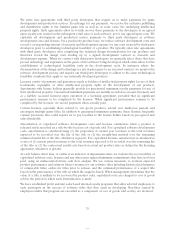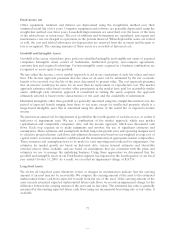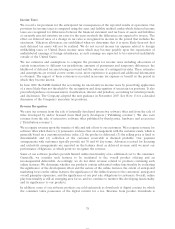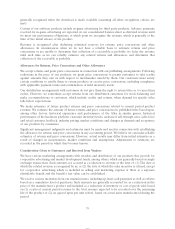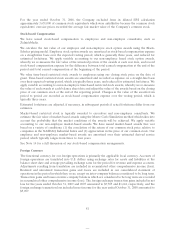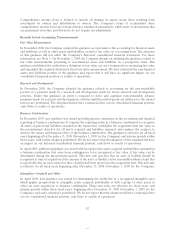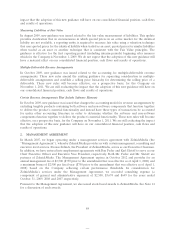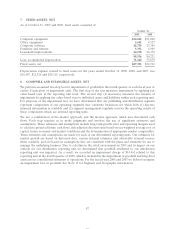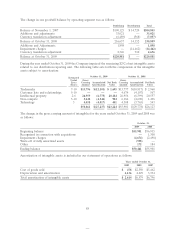2K Sports 2009 Annual Report Download - page 83
Download and view the complete annual report
Please find page 83 of the 2009 2K Sports annual report below. You can navigate through the pages in the report by either clicking on the pages listed below, or by using the keyword search tool below to find specific information within the annual report.Income Taxes
We record a tax provision for the anticipated tax consequences of the reported results of operations. Our
provision for income taxes is computed using the asset and liability method, under which deferred income
taxes are recognized for differences between the financial statement and tax bases of assets and liabilities
at currently enacted statutory tax rates for the years in which the differences are expected to reverse. The
effect on deferred taxes of a change in tax rates is recognized in income in the period that includes the
enactment. Valuation allowances are established when we determine that it is more likely than not that
such deferred tax assets will not be realized. We do not record income tax expense related to foreign
withholding taxes or United States income taxes which may become payable upon the repatriation of
undistributed earnings of foreign subsidiaries, as such earnings are expected to be reinvested indefinitely
outside of the United States.
We use estimates and assumptions to compute the provision for income taxes including allocations of
certain transactions to different tax jurisdictions, amounts of permanent and temporary differences, the
likelihood of deferred tax assets being recovered and the outcome of contingent tax risks. These estimates
and assumptions are revised as new events occur, more experience is acquired and additional information
is obtained. The impact of these revisions is recorded in income tax expense or benefit in the period in
which they become known.
In June 2006 the FASB clarified the accounting for uncertainty in income taxes by prescribing application
of a more likely than not threshold to the recognition and derecognition of uncertain tax positions. It also
prescribed guidance on measurement, classification, interest and penalties, accounting for interim periods,
and disclosures. The Company adopted the new guidance in November 2007. See Note 13 for a detailed
discussion of the Company’s uncertain tax positions.
Revenue Recognition
We earn our revenue from the sale of internally developed interactive software titles and from the sale of
titles developed by and/or licensed from third party developers (‘‘Publishing revenue’’). We also earn
revenue from the sale of interactive software titles published by third parties, hardware and accessories
(‘‘Distribution revenue’’).
We recognize revenue upon the transfer of title and risk of loss to our customers. We recognize revenue for
software titles when there is (1) persuasive evidence that an arrangement with the customer exists, which is
generally based on a customer purchase order, (2) the product is delivered, (3) the selling price is fixed or
determinable and (4) collection of the customer receivable is deemed probable. Our payment
arrangements with customers typically provide net 30 and 60 day terms. Advances received for licensing
and exclusivity arrangements are reported on the balance sheet as deferred revenue until we meet our
performance obligations, at which point we recognize the revenue.
Some of our software products provide limited online functionality at no additional cost to the consumer.
Generally, we consider such features to be incidental to the overall product offering and an
inconsequential deliverable. Accordingly, we do not defer revenue related to products containing such
online features. We determine whether our products contain substantial online functionality by evaluating
the significance of the development effort and the nature of the online features, the extent of anticipated
marketing focus on the online features, the significance of the online features to the customers’ anticipated
overall gameplay experience, and the significance of our post sale obligations to customers. Overall, online
play functionality is still an emerging area for us, and we continue to monitor this developing functionality
and its significance to our products.
In addition, some of our software products are sold exclusively as downloads of digital content for which
the consumer takes possession of the digital content for a fee. Revenue from product downloads is
78


